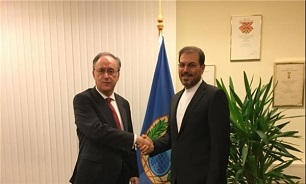US Sanctions Obstructing Medications Imports for CW Victims
 In a meeting with Director General of the Organization for the Prohibition of Chemical Weapons (OPCW) Fernando Arias on the sidelines of the 24th session of the Conference of the States Parties to the Chemical Weapons Convention (CWC), Dehqani Condemned the US economic terrorism against Iran, and elaborated on its impacts on providing chemical victims with necessary medicine and equipment, saying that it is against the country's commitments as well as the other countries obeying the US under its pressure.
In a meeting with Director General of the Organization for the Prohibition of Chemical Weapons (OPCW) Fernando Arias on the sidelines of the 24th session of the Conference of the States Parties to the Chemical Weapons Convention (CWC), Dehqani Condemned the US economic terrorism against Iran, and elaborated on its impacts on providing chemical victims with necessary medicine and equipment, saying that it is against the country's commitments as well as the other countries obeying the US under its pressure.
he discussed avenues for exploring cooperation between Iran and the entity, and stressed the need for nondiscriminatory implementation of all provisions of the Chemical Weapons Convention (CWC).
Dehqani also called on the countries to do fulfill their commitments over exchanging chemical materials and equipment for peaceful uses, remove obstacles in the way of trade among the countries and not impose economic sanctions on member states.
Highlighting the role of consensus in making decisions in organizations dealing with mass destruction weapons, he reiterated strategic role of director general in promoting consensus within the organization.
The 24th session of the Conference of the States Parties to the Chemical Weapons Convention opened in The Hague on Monday and will continue until Friday.
Iranian NGOs whose activities are related to victims of chemical arms have set up an exhibition on the fringes of the conference to make member states familiar with the latest developments pertaining to victims of chemical weapons.
The Conference of the States Parties to the Chemical Weapons Convention is the most important policy-making forum of the OPCW.
The annual conferences bring together 193 member states which discuss the latest international developments and policies with regards to countering the use of chemical weapons.
ack in October, Iran’s ambassador and permanent representative to the OPCW said that unilateral US sanctions have prevented the country’s access to medical and health services required to treat victims of chemical attacks carried out by former Iraqi dictator Saddam Hussein in the 1980s.
“The inhumane sanctions have negatively impacted the supply of medicines and treatment for more than 70,000 victims of chemical weapons in our country and have in fact hindered the treatment of chemical attacks victims,” Alireza Kazemi Abadi said.
Late in June, Iran's Foreign Minister Mohammad Javad Zarif said that the US is the only country in the world owning chemical weapons, adding that the world will not be free from those weapons unless Washington destroys its arsenal of prohibited arms.
Iran believes that a main step toward having a world free of weapons of mass destruction (WMD) is "to completely destroy the chemical weapons arsenal of the US as the only owner of such weapons in the world", Zarif said on June 28, in a message on the anniversary of the chemical attacks on the Northwestern Iranian city of Sardasht.
There he added, "Iran, once more, emphasizes its principal policy of condemnation of using chemical weapons anywhere, anytime and under any circumstances."
Criticizing the US for "being addicted to using inhumane tool of economic sanctions and terrorism" against Iran, Zarif said that the move has made the access of the victims of the chemical attack to the required medication much more difficult.
The former regime of Iraq, backed by some Western countries, particularly the US, attacked various parts of Iran by chemical weapons during the eight-year war (1980-1988) against Iran.
The regime of Saddam was provided with the chemical weapons by Western countries, mainly Germany, France, the UK and the US.
The Iranian foreign minister said the US sanctions are imposed on Iran in violation of the international humanitarian law, and the spirit of non-proliferation conventions, and called on the Organization for the Prohibition of Chemical Weapons (OPCW) to find an immediate solution for removing obstacles on the way to supplying the medications needed by the patients.
"The intentional negligence and ignorance of the international community and the member-states of the chemical weapons convention in the face of such harassing moves by the US, like their silence thirty-one years ago on the savage attack of the Baath dictator, backed by the US, against the defenseless civilians in Sardasht is deeply regrettable," he said in the message.
Then European states, over the eight-year war, either kept silent in the face of the chemical attacks or turned down Iran's frequent request for deployment of experts for field investigations. The declassified documents in the US, however, show that Washington was aware of the chemical weapons use by Saddam regime since the onset of the war, and it had backed the usage of the chemical weapons over the years.
Zarif also said that not holding accountable the perpetrators of the chemical attacks along with their accomplices and supporters has given way to the extremist groups in the Middle East region to commit similar crimes.
Recounting some related achievements and measures on the treatment of the chemical attacks victims taken by Iran at the international level, he affirmed that Tehran will spare no effort in restoring the rights of the injured people through legal and international channels.
In 1988, Iran presented the UN the full information on the chemical attacks committed by the Iraqi Baathist regime since January 1981 till March 1988; a report with striking data: more than 56,700 people lost their lives in the attacks.
Zarif's message was read out by Iran's Foreign Ministry's Spokesman Abbas Mousavi at a commemoration ceremony in Sardasht.
Message end/
